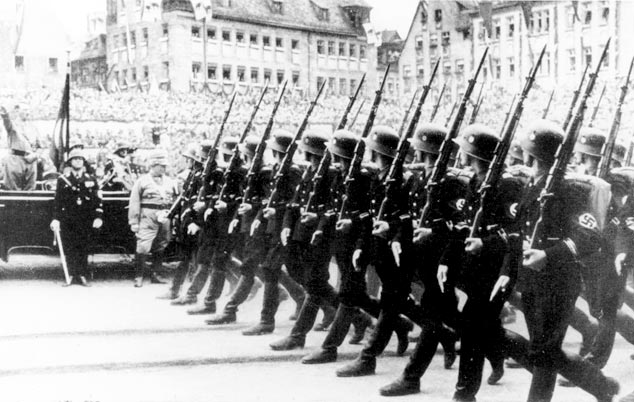
When the German Reich invades Poland on September 1, 1939, a war begins in Europe that will escalate into a World War two years later. The "Reich Party Rally of Peace" planned for the beginning of September in Nuremberg is cancelled on August 26.
Though it has been hard at first for many contemporaries to tell, National Socialist foreign policy has meant preparing for war from the very start. As the "rearmament" of Germany in terms of internal, economic and military policy begins, Hitler enjoys spectacular foreign policy successes during his first years in power.
In 1938, when the Wehrmacht marches into Austria and the Sudetenland is annexed from Czechoslovakia – in the latter case, with the consent of England, France and Italy – an old dream of German nationalism seems fulfilled: to establish a shared realm for all Germans.
But although Hitler invokes equal rights and ethnic self-determination at every move, he is really interested in more. The invasion of Czechoslovakia on March 15, 1939, signals the final transition to an unconcealed policy of expansion.
For the first time, though, it now also becomes clear that the Western powers, who have offered little resistance to Hitler's foreign policy so far, will make no further concessions. By attacking Poland, Germany plunges the world into a new, even more devastating war.
When powerful German units invade Poland on September 1 without declaring war, the Polish armed forces have little to offer in opposition. Fast, mobile Panzer troops, working in concert with bombers, carry the Wehrmacht within three weeks to the line that Hitler and Stalin have drawn a short time earlier in a mutual non-aggression pact.
The United Kingdom and France, as guarantors of Poland's autonomy, quickly react by declaring war on Germany. In 1940, after a phase without military action, the Germans occupy Denmark, Norway, Luxembourg, the Netherlands, Belgium and France in a series of swift campaigns. Within just three months, they control almost all of Western Europe.
Only Great Britain continues to fight the German Reich. Its island location protects it from German land forces, so it is attacked by air at first, and later by the submarine fleet in the Atlantic as well as in the Mediterranean region. The aim is to disrupt British supply lines.
In Southeast Europe and North Africa, Hitler moves quickly to support his ally Italy. In 1941 the Wehrmacht occupies Yugoslavia and Greece. These military triumphs raise Hitler’s popularity to a new high among the Germans.
Continue reading: "From war of expansion to war of annihilation"



